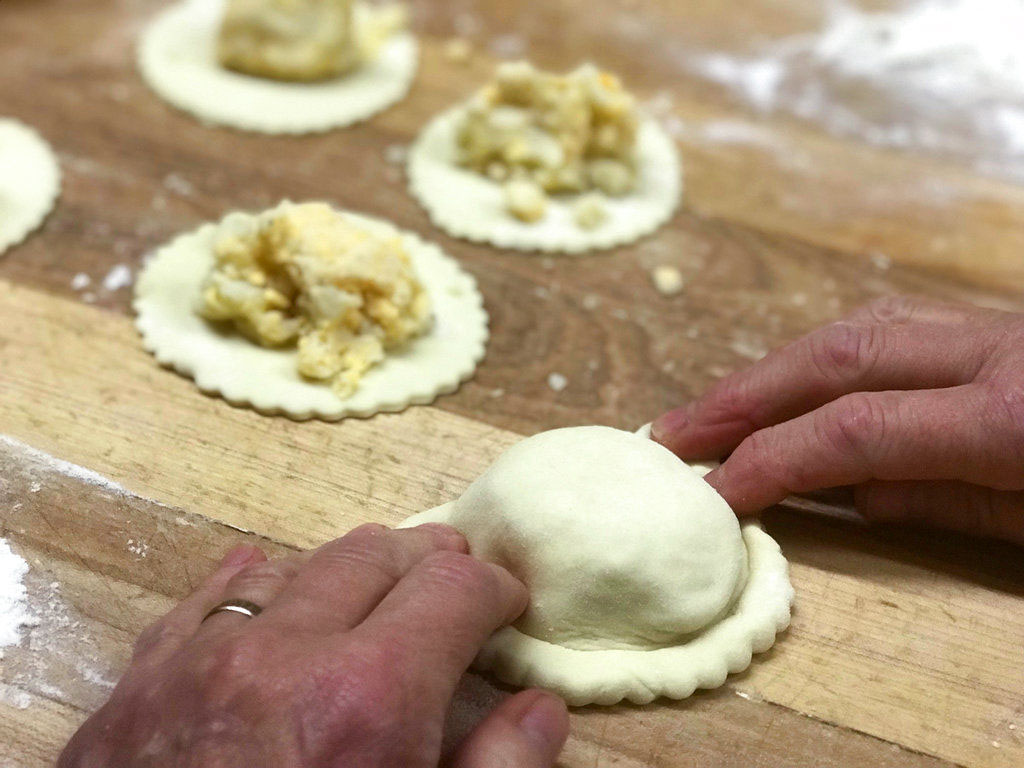
Holiday Menus Are Heavy On Nostalgia
Article Published by: dothaneagle.com
When Devin Kidner was a child, she looked forward to the box of goodies her aunt sent from England each December.
In addition to chocolates and gifts, the box contained powdered mustard and custard, pickles and other foods that her father needed to prepare the family’s annual Christmas meal. A British native who moved to the United States, Graham Kidner relishes the chance to share the foods of his childhood with his family, said his daughter, now 31 and living in Chicago.
“This is his way to feel connected to his family,” she said. “It keeps him tied to England.”
The meal, along with regular visits “across the pond,” helped Kidner appreciate her heritage. She can’t imagine eating anything other than a traditional English roast on Christmas.
“It wouldn’t be Christmas without the food,” she said.
Holiday meals are an easy way for children to absorb lessons about their ethnicity and ancestors, said Amy Bentley, a professor of food studies at New York University. Because eating and dining together involve all the senses, it creates powerful memories, she said.
“It’s nutrition, but it’s also culture,” she said. “It’s a way of saying, this is who we are, and this is what’s important.”
The internet and the popularity of import stores and specialty grocers have made it easier to access beloved foods at the holidays.
Leslie Srodek-Johnson of Stan’s Northfield Bakery, which sells handmade pierogis in Northfield, Ohio, says the shop increases production of the potato-filled dumplings tenfold in December. Pierogis are commonly served at Christmas and during Lent in many Polish, Czech, Slovak and Hungarian households.
The demand is so great that Stan’s stops taking pierogi orders two weeks before Christmas. Srodek-Johnson has had people show up at the bakery with tattered recipes or lists of ingredients asking whether she could help reproduce their grandmother’s pierogis.
She and her family use their great aunt’s traditional recipe.
“We have found a lot of people just can’t reproduce grandma’s handiwork at home,” she said. “Many people tell us that ours are as good or better.”
The Kennedy clan in Beresford, South Dakota, is determined to keep their potato sausage recipe in the family. Every December, the various generations gather to make the sausage that Katie Kennedy Westra’s great-great grandma brought from Sweden.
“Grandma tells us all what to do,” she said. “It’s always such a hoot.”
They serve the sausage with mustard and lingonberries at their Christmas celebration. While the meal remains a way for Westra and her siblings to stay connected to their roots, they recently discovered that their family in Sweden no longer makes the sausage.
“I have a cousin over there who never even heard of it,” said Westra, 35. “She asked me to send the recipe.”
Regardless, she said, the tradition has already taken hold in her family’s next generation. “My oldest is in 4-H and she wrote a speech about her Swedish heritage for the state fair,” she said. “She’s very into it.”
Dustin Shearon, 45, would never attempt to make Moravian Sugar Cake, his favorite holiday treat, at home. For him, the store-bought version brings back memories of his mother and grandmother taking him to Dewey’s Bakery in his hometown, Winston-Salem, North Carolina. The cinnamon and sugar coffee-style cake, which was brought to the region by Moravian settlers in the mid-1700s, remains a local favorite. Many children are introduced to it during school field trips to a living history village known as Old Salem.
Shearon was delighted to discover that a grocery store in his new home town of Charlotte, North Carolina, had started stocking the Dewey’s cake at the holidays. It offered him a way to share stories about his childhood with his son and daughter.
“It’s a connection to my past, and a way to talk about the life I shared with my mom and grandma,” he said.
He serves the cake on Thanksgiving and Christmas: Not having it, he says, “would be like not having sweet potato casserole on Thanksgiving. I would be distraught if I could not get my Moravian sugar cake.”
Josh McCutchen, Dewey’s vice president of marketing, said the company ships the cakes all over the country during the holiday season.
Ann Jones, meanwhile, ships cinnamon sticks to her grandchildren in New York every Thanksgiving and Christmas to give them a taste of Ohio, where she grew up. She also keeps some of the cinnamon sticks — made from layers of sweet dough and cinnamon at The Original Goodie Shop in Columbus — in her freezer at home in Jupiter Island, Florida.
“My grandchildren have never been to Ohio. They don’t have any connection to Columbus, but they love cinnamon sticks,” she said.
About Scott Livengood
Scott Livengood is the owner and CEO of Dewey’s Bakery, Inc., a commercial wholesale bakery with a respected national brand of ultra premium cookies and crackers.
Previously, Scott worked at Krispy Kreme Doughnuts for 27 years, starting as a trainee in 1977. He was appointed President of the company in 1992, then CEO and Chairman of the Board.
Scott has served on numerous boards including the Carter Center, the Calloway School of Business and the Babcock School of Management, Habitat for Humanity of Forsyth County, and the Winston-Salem Chamber of Commerce.
He started a new business, StoryWork International, in 2016 with Richard Stone. The signature achievement to date is LivingStories, a story-based program for improved patient experiences and outcomes in partnership with Novant Health.




